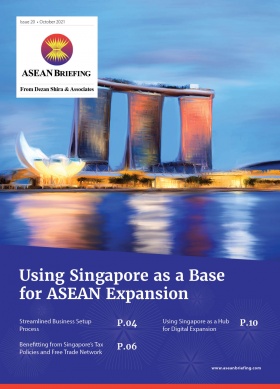Establishing a Private Limited Company in Malaysia
Establishing a private limited company (locally known as a Sendirian Berhad – Sdn Bhd) is the most common type of business entity in Malaysia for foreign investors.
The entity offers a host of benefits, such as being able to be 100 percent foreign-owned and being relatively quick to setup.
Malaysia’s economy has been thriving over the last few decades and has emerged as a growing market for high-end products, with many multinationals incorporating the country into their global value chains. This was stimulated by the commitment of continuous governments to develop the country into a knowledge base. Its innovation-driven economy is supported by tax incentives, a well-developed finance sector, and well-maintained land, sea, and air connections.What is a Sendirian Berhad?
The Sendirian Berhad, or private limited company, can be established by locals and foreigners. Further, it can also be 100 percent foreign-owned.
There are some key characteristics of a private limited company in Malaysia.
Limited liability
The company’s shareholders are liable for the debts accrued by the company in accordance with the amount they invested, and no more.
Status as a separate legal entity
The private limited company is a separate legal entity from its shareholders and thus allows the company to operate regardless of if the directors and shareholders have retired, died, or changed unless the entity is dissolved.
Ease of fundraising
The Sdn Bhd company can raise loans and the entity can borrow from banks at lower rates compared to other business structures. This is because many banks view loans issued to private limited companies as a lower risk compared to loans for other business entities.
Financial and non-financial incentives
There are more financial and non-financial incentives given to private limited companies compared to other business structures, such as an investment tax allowance.
How to setup the private limited company in Malaysia
The registration process can take between five to 10 working days, and there are several documents’ that applicants need to submit to the Companies Commission of Malaysia, or Suruhanjaya Syarikat Malaysia (SSM). The SSM is the governing body that oversees companies operating in Malaysia.
To begin the setup, applicants must provide the following documentation:
- Company name;
- Constitution of the company
- Declaration of compliance with the Companies Act;
- Primary business activities;
- Details of directors and shareholders;
- Address in Malaysia;
- Minimum paid-up capital;
- Percentage of the shareholding of each shareholder; and
- A declaration by the directors that they have not been convicted of any offense and are not undischarged bankrupts.
How much does it cost to incorporate a company in Malaysia?
Registration fees
There is a flat rate of 1,000 ringgit (US$238) to register the company with the SSM, however, the fee is determined by the nominal share capital.
|
Registration Fees for Private Limit Companies in Malaysia |
|
|
Nominal share capital |
Fees |
|
Up to 1 million ringgit (US$238,380) |
5,000 ringgit (US$1,191) |
|
Exceeding 1 million ringgit (US$238,380) but not more than 10 million (US$2.38 million) |
20,000 ringgit (US$4,767) |
|
Exceeding 10 million (US$2.38 million) but not more than 50 million ringgit (US$11.9 million) |
40,000 ringgit (US$9,535) |
|
Exceeding 50 million ringgit (US$11.9 million) but not more than 100 million ringgit (US$23.8 million) |
60,000 ringgit (US$14,302) |
|
Exceeding 100 million ringgit (US$23.8 million) |
70,000 ringgit (US$16,686) |
If the foreign company does not prescribe any share capital, then the registration fee is charged at the flat rate of 1,000 ringgit (US$238).
Paid-up capital
Incorporating a company in Malaysia requires no paid-up capital. However, if the company wants to issue work permits for foreign employees, a 100 percent foreign-owned company must commit to a minimum paid-up capital, the amount of which is decided as follows:
- Advisory and consultancy businesses – 500,000 ringgit (US$119,000);
- Import, export, trading, and restaurant businesses – 1 million ringgit (US$238,380);
- Joint venture with a Malaysian partner (with at least 50 percent shares) – 350,000 ringgit (US$83,433) in paid-up capital and 500,000 ringgit (US$119,190); and
- Non-export-oriented industries – 100,000 ringgit (US$23,838) and with a minimum with total minimum sales of 2 million ringgit (US$476,460).
Further Reading
- Establishing a Representative Office in Malaysia: A Guide for Foreign Investors
- Malaysia Issues Tax Exemption for Foreign Sourced Income
- New Tax Measures Impacting Businesses and Individuals in Malaysia’s Budget 2022
About Us
ASEAN Briefing is produced by Dezan Shira & Associates. The firm assists foreign investors throughout Asia and maintains offices throughout ASEAN, including in Singapore, Hanoi, Ho Chi Minh City, and Da Nang in Vietnam, Munich, and Esen in Germany, Boston, and Salt Lake City in the United States, Milan, Conegliano, and Udine in Italy, in addition to Jakarta, and Batam in Indonesia. We also have partner firms in Malaysia, Bangladesh, the Philippines, and Thailand as well as our practices in China and India. Please contact us at asia@dezshira.com or visit our website at www.dezshira.com.
- Previous Article Singapore’s 2022 Public Holidays
- Next Article Why ASEAN’s Industrialization Plans Will Necessitate Local Human Resource Development







